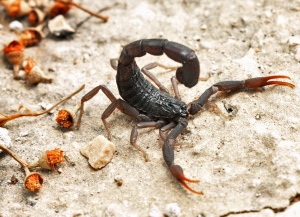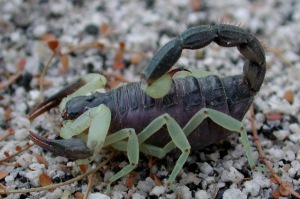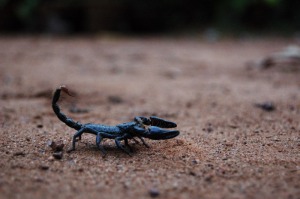I have been terrified of these arthropods ever since I saw the film Hook, where a pirate is thrown overboard in a box with just a nasty looking scorpion for company! The more I read about them, the more I came to fear ever coming across one. So I have developed my own scorpion survival manual which I would like to share with you.
Scorpions have been scuttling about the earth for as long as 430 million years – maybe even longer, this is just the age of the oldest scorpion fossil that has been found! That means they have had plenty of time to learn how best to go about their business and I can’t help thinking they must have nailed it by now; you have to be a pretty successful animal to survive for so long! These ancient scorpions were found on the bottom of the ocean floor, but today they can be found in virtually every terrestrial habitat – from mountain slopes to the middle of the desert. And this makes scaredy-cats like me nervous.
However, there is actually nothing much to worry about. Although they can look pretty deadly, only 25 of the 1000+ species that have been discovered actually have venom strong enough to kill one of us – that’s not even 2% (phew!) However, for the insects and even small lizards that these arachnids prey on (yes, they belong to the same group as spiders – no wonder they’re so scary) things aren’t so easy.
With 8 legs and a tail spiked with a stinger loaded with venom, these animals are definitely not to be messed with. Those scorpions that do possess venom strong enough to kill one of us can do so in just a few hours – so think of the damage that can be done to a much smaller animal. Scorpions have become experts at hunting adapting themselves into fierce killing machines.
Firstly they have eyes everywhere – to be more precise, 6 pairs are distributed around the top of their carapace (or shell) and they have one large pair on the top of their head. Although these eyes don’t produce as detailed an image as ours can, they are able to register the smallest of movements. Even more wonderful, scorpions have sunglasses – each tiny element in the eye contains small granules of pigments that move towards the surface of the eye to form a sunscreen!
 But eyes aren’t the only way these arachnids can detect their prey. They have hairs on their claws that can detect sound and slit-shaped organs in their legs that are capable of detecting tiny vibrations, such as those caused by a crawling prey. If this wasn’t enough the underside of their last pair of legs are covered in comb-like structures that are able to taste and smell chemicals on the surface as they move (these are called chemoreceptors). This makes them experts in detecting their prey.
But eyes aren’t the only way these arachnids can detect their prey. They have hairs on their claws that can detect sound and slit-shaped organs in their legs that are capable of detecting tiny vibrations, such as those caused by a crawling prey. If this wasn’t enough the underside of their last pair of legs are covered in comb-like structures that are able to taste and smell chemicals on the surface as they move (these are called chemoreceptors). This makes them experts in detecting their prey.
Scorpions are also extremely resilient little creatures. They can withstand freezing temperatures for several weeks as well as surviving boiling hot deserts. They are also able to survive underwater for 2 days! Perhaps most fascinating of all, they can survive without food for up to a year! Good news for the animals they hunt – but not if you’re the unlucky one that gets caught. It is their efficient food storage organ, along with their inactive lifestyle and low metabolic rate, that make this possible.
When they do catch their prey, they use a usual way of actually eating it! They catch their prey in their large pincers and use their stinger to inject it with venom – this either kills it or paralyses it. The scorpion then gets to work shredding up their dinner using a small claw-like structure called a chelicerae. This protrudes from their mouth and pulls small amounts of food off their prey. These shreds of food are put into a special chamber in the mouth known as the pre-oral cavity where they are soaked in digestive fluids. This dissolves the food into a liquid food that the scorpion can then enjoy.
Scorpions like the dark and will avoid the light as much as possible. However, what I found completely fascinating is that scorpions actually glow in the dark! Under UV lights scorpions glow a bright, luminous colour! The exact reason for this is not yet clear. If only the scorpion preys of this world were equipped with UV lights!
So there really is no need to worry unless you’re a cockroach or a small lizard. As for that 2% that can harm humans, my advice to you is just to stay away. Stick to the snow topped peaks of mountains or Antarctica where scorpions have yet to venture. If you do happen to meet a particularly nasty one I’m afraid the covering-it-with-a-glass trick that proves so successful with spiders won’t work – some of these reach over 20cm! My best advice is to stand on a chair until the scorpion gets bored or dies of natural causes – it shouldn’t be too long; most scorpions only live between 5 and 8 years, just hope you don’t meet the one scorpion recorded to have lived for 25 long years!





